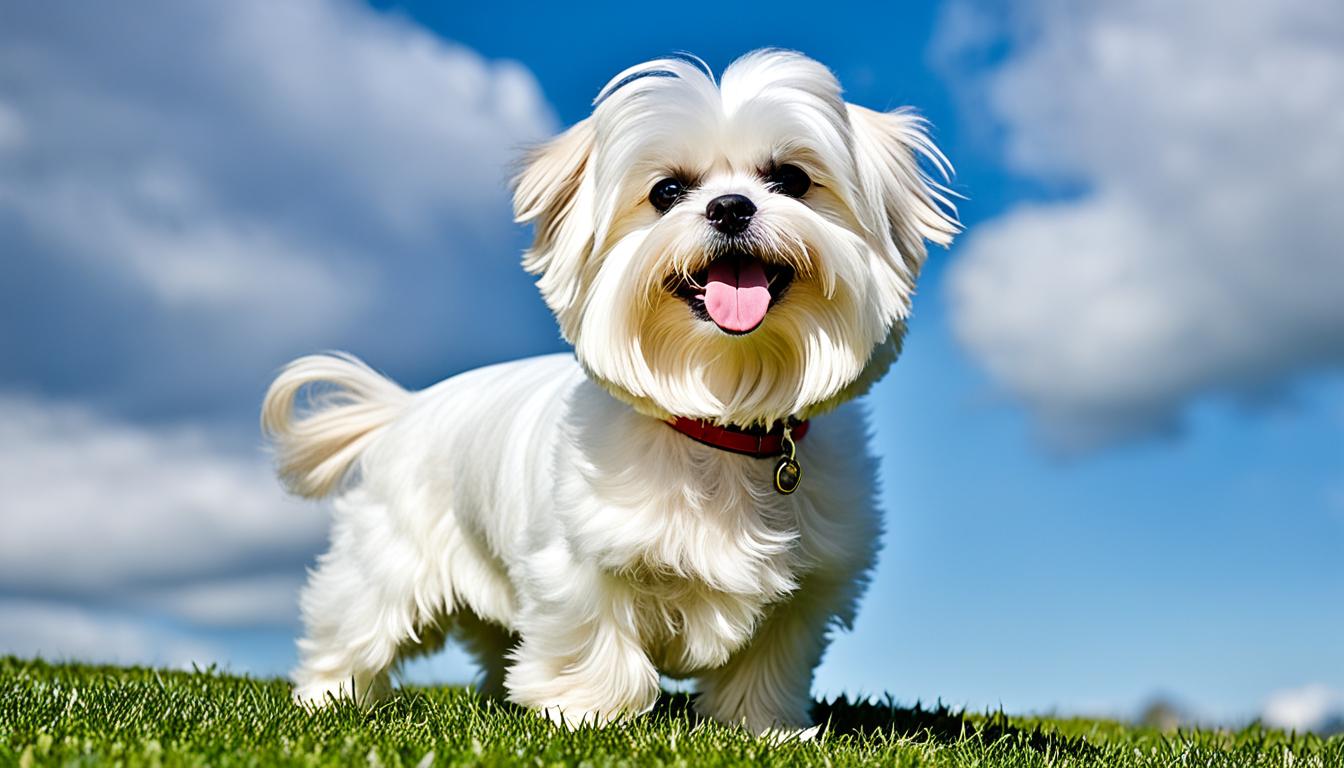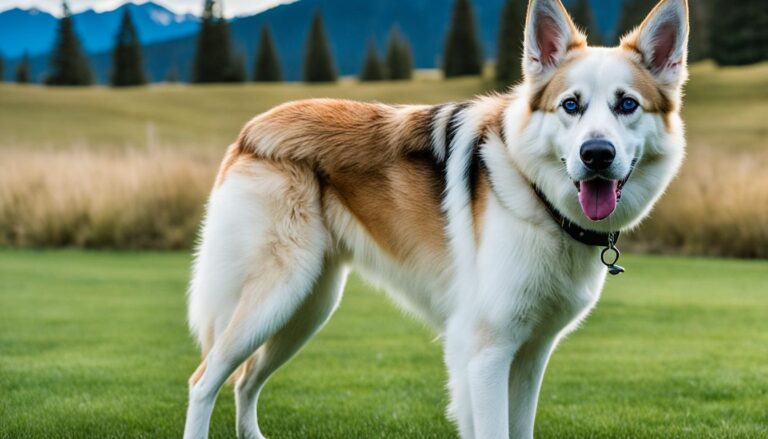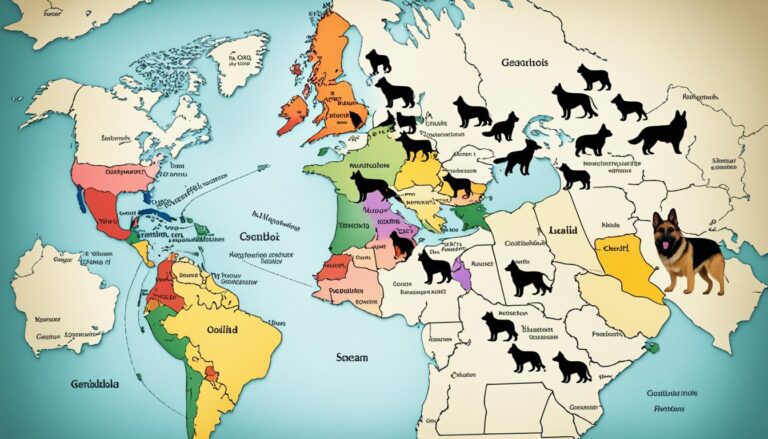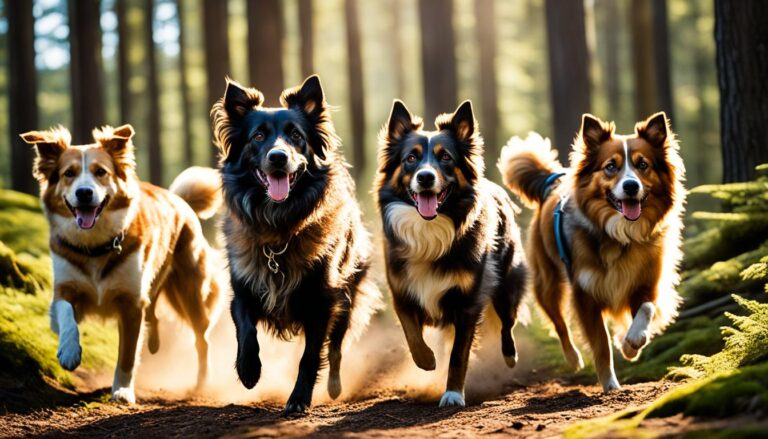Maltese Full Description: Essential Breed Insights
Did you know that Maltese dogs are not only adorable but also have a fascinating history that spans over two millennia? These small, white, long-haired companions have been cherished for centuries and continue to captivate dog lovers around the world.
In this article, we will dive into the world of Maltese dogs, providing you with all the information you need to know about this delightful breed. From their characteristics and care requirements to their health considerations and presence in pop culture, we will unravel the charms of Maltese dogs.
Key Takeaways:
- Maltese dogs have a rich history that dates back over two millennia.
- They are small, white, long-haired companions known for their playful and affectionate nature.
- Maltese dogs are intelligent, trainable, and adaptable to various living environments.
- Grooming is essential for maintaining their elegant coat, and dental care is crucial due to their small size.
- Maltese dogs have minimal health issues but may be prone to certain genetic conditions.
Maltese Dog Characteristics: Size, Coat, and Temperament
When it comes to the Maltese breed, there are several distinctive characteristics that set them apart. From their size and coat to their temperament and behavior, Maltese dogs have a charm that captures the hearts of many. Let’s take a closer look at what makes Maltese dogs truly special.
Size: Maltese dogs are small in size, typically standing between 7-9 inches tall at the shoulder. They have a dainty stature that adds to their adorable appeal. In terms of weight, Maltese dogs usually range from 4-7 pounds, making them perfect for those looking for a pint-sized companion.
Coat: One of the most striking features of a Maltese dog is their beautiful coat. They have a long, silky, and straight white coat that is their signature look. Although the majority of Maltese dogs are all white, some may have slight lemon or tan markings, adding a touch of uniqueness to their appearance.
Temperament and Behavior: Maltese dogs are known for their gentle, affectionate, and playful nature. They have a spirited and lively personality that brings joy into the lives of their owners. Despite their small size, Maltese dogs have a big heart and an excellent ability to form strong bonds with their human companions.
A Maltese dog’s loyalty knows no bounds. They are always by your side, ready to shower you with love and attention.
These charming dogs have a curious and alert nature, always keeping an eye out for any signs of activity. Their playful and mischievous side adds an element of fun to daily interactions. Whether it’s fetching a toy, playing a game of chase, or simply snuggling up on the couch, Maltese dogs are eager to participate in whatever activity you have in mind.
Now that we have uncovered the characteristics that make Maltese dogs so endearing, let’s move on to the next section, where we will explore their care needs and how to ensure their overall well-being.
| Maltese Dog Characteristics | Size | Coat | Temperament |
|---|---|---|---|
| Description | Small size, typically 7-9 inches tall | Long, silky, and straight white coat with possible lemon or tan markings | Gentle, affectionate, playful, and alert; forms strong bonds and known for loyalty |
GALLERY
Maltese Dog Care Guide: Exercise, Training, and Grooming
When it comes to caring for your Maltese dog, there are several important aspects to consider. From exercise and training to grooming, providing the right care is crucial for their overall well-being.
Exercise
Maltese dogs have moderate exercise needs and can be satisfied with short daily walks and indoor playtime. Despite their small size, they still require regular physical activity to maintain their health and prevent weight gain. In addition to walks, interactive toys and games can help keep them mentally stimulated and physically fit.
Training
Maltese dogs are intelligent and eager to please, making training a rewarding experience for both you and your furry friend. However, they can have a stubborn streak, so consistent and positive reinforcement methods work best. Use treats, praise, and rewards to motivate them, and be patient and persistent in your training efforts. Basic obedience commands and socialization are essential for a well-behaved Maltese.
Grooming
Grooming is an important aspect of caring for Maltese dogs, particularly due to their long, silky hair. Regular grooming helps prevent matting, tangles, and skin issues. Daily brushing is recommended to keep their coat healthy and free from knots. Additionally, professional grooming every 4-6 weeks can help maintain their coat’s appearance and hygiene.
When grooming your Maltese, pay attention to their eyes and ears. Clean their eyes gently with a damp cloth and check for any signs of discharge or irritation. Similarly, clean their ears with a veterinarian-approved ear cleaner and check for any signs of redness, odor, or excessive wax buildup.
| Grooming Tips for Maltese Dogs |
|---|
| 1. Use a slicker brush to gently remove tangles and knots from their coat. |
| 2. Trim their nails regularly to prevent them from becoming too long and causing discomfort. |
| 3. Brush their teeth regularly to maintain good dental hygiene and prevent dental issues. |
| 4. Keep their paws clean and check for any signs of cuts, debris, or irritation. |

By following these grooming tips and establishing a regular grooming routine, you can help ensure that your Maltese dog’s coat remains healthy, shiny, and beautiful.
In summary, Maltese dogs require moderate exercise, consistent and positive training, and regular grooming. By providing them with the proper care and attention, you can help your Maltese live a happy and healthy life.
Maltese Health Issues: Dental Problems and Genetic Conditions
Maltese dogs are generally healthy, but they may be prone to certain health issues. It is important for Maltese owners to be mindful of these potential problems to ensure the well-being of their furry companions.
Dental Problems
Due to their small size, Maltese dogs are susceptible to dental issues. The compact structure of their mouths can lead to dental crowding, plaque buildup, and gum disease. Neglecting dental care can result in tooth loss and other oral health complications.
Implementing good oral hygiene practices for your Maltese is crucial. Regular teeth brushing using dog-friendly toothpaste, providing dental chews or toys, and scheduling professional dental cleanings are essential steps in maintaining their oral health.
Genetic Conditions
While Maltese dogs are generally healthy, there are several genetic conditions to be aware of. Responsible breeders prioritize health screenings to minimize the risk of these conditions.
| Condition | Description |
|---|---|
| Luxating Patella | A condition where the kneecap pops in and out of place, causing discomfort and potential mobility issues. |
| Patent Ductus Arteriosus | A heart condition where the fetal blood vessel fails to close after birth, leading to improper circulation. |
Regular veterinary check-ups and health screenings, including cardiac evaluations and orthopedic examinations, can help identify these genetic conditions early on. Early detection allows for timely intervention and appropriate management to ensure the best quality of life for your Maltese.
By staying informed about potential health issues and taking proactive measures, Maltese owners can help their beloved pets lead healthy and happy lives.
The History and Origin of Maltese: An Ancient Breed
The Maltese breed has a rich history that dates back over two millennia. Originally bred in the Mediterranean region, these dogs were adored by aristocracy for their exquisite beauty, elegant appearance, and charming personalities.
Depicted in ancient art and literature, the Maltese were revered as companions and often seen in the company of royalty and nobility. Their pure white coats and enchanting demeanor made them a symbol of luxury and refinement.
Over the centuries, the Maltese breed has maintained its distinctive traits and characteristics, thanks to its status as a purebred. This breed’s lineage can be traced back to ancient times, making it one of the oldest known dog breeds.
The Maltese’s journey through history is a testament to their enduring appeal and endearing nature. They have captivated hearts throughout the ages and continue to be cherished as beloved companions in the modern world.
Discover more about the fascinating history and origin of the Maltese breed in the table below:
| Timeline | Historical Events |
|---|---|
| 500 BC | The Maltese breed is believed to have originated in the Mediterranean region, specifically on the island of Malta. |
| 300 BC | Aristocracy and nobility across ancient civilizations, including the Greeks and Romans, begin to adopt Maltese dogs as cherished companions. |
| 15th Century | The Maltese breed gains popularity among European nobility, becoming fashionable lapdogs and appearing in royal portraits and tapestries. |
| 19th Century | The Maltese is recognized as a distinct breed by kennel clubs, solidifying its place in the world of purebred dogs. |
| 20th Century | The Maltese spreads beyond aristocratic circles and becomes a beloved companion to people of all walks of life. |
The Maltese breed’s history is a testament to its enduring appeal and remarkable journey through time. From their noble beginnings to their cherished status today, these dogs continue to captivate hearts and bring joy to countless households around the world.
Maltese in Pop Culture: Famous Owners and Mixes
The Maltese breed has enjoyed popularity among numerous famous individuals throughout history, further cementing its status in pop culture. One such notable owner of a Maltese was Elizabeth Taylor, the renowned actress, who was frequently photographed with her beloved Maltese named Sugar. Their bond showcased the breed’s endearing qualities and timeless appeal.
Moreover, the Maltese has also contributed to the rise of popular mixed breeds, resulting in adorable and affectionate companions. Some of the well-known Maltese mixes include:
- The Maltese Poodle or Maltipoo: This mix combines the unique characteristics of the Maltese with the intelligence and hypoallergenic coat of the Poodle. The Maltipoo is known for its playful nature, intelligence, and low-shedding coat.
- The Maltese Shih Tzu: This mix merges the Maltese with the Shih Tzu breed, creating an adorable and friendly companion. The Maltese Shih Tzu is cherished for its affectionate nature, lively personality, and charming appearance.
- The Maltese Yorkie or Morkie: Combining the Maltese with the Yorkshire Terrier, the Morkie brings together two beloved small breeds. These mixes inherit the Maltese’s loyalty, playfulness, and sweet demeanor, along with the Yorkie’s spunky spirit.
These Maltese mixes maintain the delightful traits of the Maltese breed while offering unique qualities and characteristics from their other parent breeds. They have become increasingly popular among dog enthusiasts, thanks to their charm and versatility in adapting to various lifestyles and environments.

| Famous Owner | Profession | Maltese’s Name |
|---|---|---|
| Elizabeth Taylor | Actress | Sugar |
| Paris Hilton | Media Personality | Tinkerbell, Marilyn Monroe, Harajuku Bitch |
| Heather Locklear | Actress | Petra |
| Britney Spears | Recording Artist | Lacy, Bit Bit |
Dogs Suitable for Apartment Living: Is the Maltese a Good Choice?
When it comes to choosing a dog breed for apartment living, size is not the only factor to consider. While the Maltese’s small size makes it suitable for apartments, other qualities such as good behavior, low energy levels, and quietness are essential. Maltese dogs can adapt well to apartment living, but it is important to prioritize their training and ensure they behave politely in shared spaces.
Living in an apartment requires certain adjustments for both dogs and their owners. Limited space and shared living areas necessitate dogs with gentle temperaments and considerate behavior. While size is often a primary concern, it is equally important to focus on traits that contribute to a harmonious living environment.
The Maltese breed, with its compact size and good behavior, can be an excellent choice for apartment living. Their small stature allows them to comfortably navigate tight spaces, making them well-suited for apartments of any size. However, it is important to remember that size alone does not guarantee a dog’s suitability for apartment living.
Key considerations for apartment living:
- Good behavior: Maltese dogs are known for their gentle and affectionate nature, making them well-suited for apartment living. Their friendly temperament allows them to coexist harmoniously with neighbors and other pets, promoting a peaceful living environment.
- Low energy levels: Maltese dogs have moderate exercise requirements, primarily consisting of short daily walks and indoor playtime. Their lower energy levels ensure they adapt well to apartment living, despite the limited space.
- Quietness: Apartment living often involves close proximity to neighbors, making noise levels an important consideration. Maltese dogs are generally quieter and less prone to excessive barking, reducing potential disturbances in shared spaces.
While the Maltese breed possesses many suitable qualities for apartment living, it is essential to prioritize their training and socialization. Proper training ensures they behave politely and respectfully, adhering to apartment rules and guidelines. By instilling obedience and good manners, Maltese dogs can become exemplary apartment companions.
Living in an apartment requires careful consideration of a dog’s behavior, energy levels, and noise tolerance. While the Maltese’s small size makes it a suitable choice, their gentle temperament, low energy, and quiet nature further enhance their compatibility with apartment living.
| Pros of Maltese for Apartment Living | Cons of Maltese for Apartment Living |
|---|---|
| – Small size allows for easy accommodation in limited spaces | – Requires regular grooming to maintain their long coat |
| – Gentle and affectionate temperament promotes harmonious living | – May be prone to separation anxiety if left alone for long periods |
| – Low energy levels make them adaptable to apartment living | – May be sensitive to extreme temperatures and changes in environment |
| – Generally quieter and less prone to excessive barking | – Training and socialization are essential for proper behavior |
Affectionate Nature of Maltese Dogs: Family Companions
Maltese dogs are beloved for their affectionate nature and their ability to form strong bonds with their families. These little dogs are known for their unwavering loyalty and constant eagerness to be by their family’s side.
They express their affection in various ways, including tail-wagging greetings that are sure to bring a smile to your face. When you come home after a long day, your Maltese will be there, wagging their tail with excitement, ready to shower you with love and attention.
Affection is not limited to greetings – cuddling is another way Maltese dogs show their love. With their soft, silky coats, they are the perfect lapdogs, always ready to snuggle up with their favorite humans. Whether you’re watching TV or reading a book, your Maltese will gladly curl up next to you, providing warmth and comfort.
But it’s not just physical affection that Maltese dogs offer. They are incredibly attuned to their owners’ emotions and are known for their emotional support. These dogs can sense when their human companions are feeling down or stressed and will do everything they can to provide comfort and solace. They are intuitive and offer a sense of companionship that can be incredibly therapeutic.
Having a Maltese as a family companion creates a sense of togetherness within the household. These dogs are social creatures who thrive on being part of the family’s activities. They will eagerly participate in family outings, adventures, and celebrations, bringing joy and laughter to every occasion.
Maltese dogs are great with children and are known for their gentle and patient nature. They can make excellent playmates for kids, providing endless entertainment and love. However, it’s essential to supervise interactions between small children and dogs to ensure everyone’s safety and well-being.
Overall, the affectionate nature of Maltese dogs makes them perfect family companions. They offer love, support, and endless cuddles, creating a warm and loving atmosphere within the home.
Famous Quote:
“A dog is the only thing on earth that loves you more than he loves himself.” – Josh Billings
Maltese Health and Care Considerations: Feeding, Exercise, and Grooming
Proper health and care are vital for the well-being of your Maltese dog. In this section, we will discuss essential aspects such as feeding, exercise, and grooming.
Feeding:
When it comes to feeding a Maltese, a balanced diet is crucial to meet their nutritional needs. High-quality dog food specifically formulated for small breeds is recommended. Look for options that contain real meat as the primary ingredient and avoid artificial additives.
It is important to establish a feeding schedule and portion control to prevent overeating and maintain a healthy weight. Maltese dogs have delicate stomachs, so avoid feeding them table scraps or human food as it can lead to digestive issues.
Exercise:
Although Maltese dogs are small in size, they still require regular exercise to keep them physically and mentally stimulated. Daily walks and playtime are essential for their overall well-being. However, it is important to note that Maltese dogs have low exercise requirements compared to other breeds.
Remember to adjust the intensity and duration of exercise according to your Maltese’s age, health, and energy levels. Engage them in interactive games and provide them with toys to keep them entertained and prevent boredom.
Grooming:
The hallmark of a Maltese dog is their beautiful, long, white coat. To keep their coat looking its best, regular grooming is necessary. Daily brushing helps prevent matting and tangling of their hair. It is recommended to use a comb or slicker brush to remove any knots gently.
In addition to brushing, routine bathing is essential to keep their coat clean and odor-free. Use a mild, dog-specific shampoo and conditioner to maintain the softness and shine of their fur. Be sure to handle them with care and keep their eyes and ears free of shampoo.
Professional grooming is also beneficial for Maltese dogs to ensure their coat is properly trimmed and maintained. Many owners opt for a shorter haircut to reduce the daily maintenance required.
| Health Aspect | Considerations |
|---|---|
| Luxating Patella | Maltese dogs may be prone to luxating patella, a condition where the kneecap dislocates. Regular exercise and maintaining a healthy weight can help minimize the risk. |
| Liver Conditions | Some Maltese dogs may be susceptible to certain liver conditions. Regular veterinary check-ups and a balanced diet are important to monitor and maintain liver health. |
By providing your Maltese with a balanced diet, regular exercise, and proper grooming, you can ensure they lead a healthy and happy life. Remember to monitor their overall well-being and consult with a veterinarian for any specific concerns or questions.
Conclusion
We have explored the Maltese breed, a delightful companion known for its playful and affectionate nature. With their small size and intelligence, Maltese dogs are well-suited for apartment living and make excellent pets for novice pet owners. They require low-maintenance care, making them an ideal choice for individuals and families looking for a loving and adaptable furry friend.
While the Maltese breed may have some health considerations, responsible breeding practices can significantly reduce the risk of genetic conditions. Regular veterinary check-ups and good oral hygiene can help maintain their overall health and well-being. The Maltese’s rich history and presence in pop culture serve as a testament to their enduring charm and popularity.
Whether you are looking for a loyal and affectionate companion or a small-sized dog that thrives in an apartment setting, the Maltese breed is worth considering. Their playful nature, intelligence, and adaptability make them cherished pets that bring joy to countless individuals and families.
FAQ
What is the Maltese breed known for?
The Maltese breed is known for their small size, white coat, playful and affectionate personality.
Where do Maltese dogs originate from?
Maltese dogs originate from the Mediterranean island of Malta.
Are Maltese dogs good for novice pet parents?
Yes, Maltese dogs are intelligent and trainable, making them great companions for novice pet parents.
What is the size and weight of Maltese dogs?
Maltese dogs typically stand between 7-9 inches tall and weigh 4-7 pounds.
What is the temperament of Maltese dogs?
Maltese dogs are gentle, affectionate, playful, and alert. They form strong bonds with their owners and are known for their loyalty.
What are the exercise needs for Maltese dogs?
Maltese dogs have moderate exercise needs and can be satisfied with short daily walks and indoor playtime.
Are Maltese dogs easy to train?
Yes, Maltese dogs are intelligent and eager to please, which makes them easy to train. However, consistent and positive reinforcement training is necessary.
How should I groom a Maltese dog?
Daily brushing and regular professional grooming are recommended for Maltese dogs to maintain their coat’s health and appearance.
What are the common health issues for Maltese dogs?
Maltese dogs may be prone to dental issues and certain genetic conditions such as luxating patella and patent ductus arteriosus.
What is the history of the Maltese breed?
The Maltese breed has a rich history that dates back over two millennia, and they were adored by aristocracy for their white coats and charming personalities.
Which famous individuals have owned Maltese dogs?
Elizabeth Taylor, a renowned actress, was often photographed with her Maltese named Sugar. There are also popular Maltese mixes, including the Maltese Poodle (Maltipoo), Maltese Shih Tzu, and Maltese Yorkie (Morkie).
Are Maltese dogs suitable for apartment living?
Yes, Maltese dogs are small in size and can adapt well to apartment living, but it is important to prioritize their training and ensure they behave politely in shared spaces.
What is the nature of Maltese dogs with their families?
Maltese dogs are known for their affectionate nature and strong bond with their families. They provide emotional support and create a sense of togetherness within the household.
How should I care for the health of my Maltese dog?
Feeding a balanced diet, providing appropriate exercise, and maintaining regular grooming practices are essential for the overall health and well-being of Maltese dogs.







